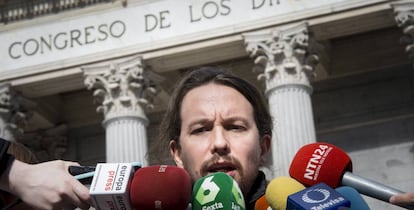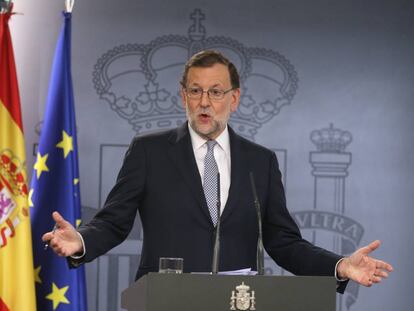Spain’s Podemos party rejects parallels with Trump
Anti-austerity party’s leader Pablo Iglesias ruffled by comparisons with US president-elect

Donald Trump’s victory in the US elections has led some Spanish political commentators to draw what seems at first an unlikely comparison between the property magnate’s populist approach and that of Pablo Iglesias, the leader of the anti-austerity grouping Podemos, which has managed to upset the political balance in Spain in a few short years.
Populism is not an ideology...it is a way of building politics from the ‘outside’ Pablo Iglesias
But Iglesias, who has called Trump a “fascist” in the past, has angrily rejected any similarity with Trump. Writing in a blog published in the online left-leaning Público, he argues: “Populists are outsiders and can be on the right, the left, or they can be ultra-liberals or protectionists, although they can use similar methods.” Albeit for different reasons, Trump and Iglesias reject trade deals and say that NATO should be overhauled.
“Populism is not an ideology or a collection of policies, it is a way of building politics from an ‘outside’ that expands at moments of crisis,” writes Iglesias, arguing that “populism doesn’t define political choices, but instead political moments.”
Despite forming an alliance with the Communist Party-led United Left in June’s elections, Podemos has always sought to avoid a left-right alignment, instead attacking what it sees as the country’s political elites, which it says includes the Socialist Party (PSOE), and defending the people.
Pablo Iglesias has called Donald Trump a fascist in the past
Iglesias says that the “populist hypothesis” that led to the creation of Podemos during the widespread street protests that swept Spain in 2011 known as the 15-M movement is now fading.
“The debate we have to have in the coming months is whether Podemos should continue to be a populist movement or not,” said Iglesias last month, defending what he called “left-wing populism” against “a Podemos that seeks compromise and respectability within the institutions of the state.”
Podemos and Trump share three types of voter: those who feel they have lost out as a result of the global crisis; those who feel their cultural and national identity is threatened by globalization; and those who want to punish the establishment. Podemos has made no appeal to Spaniards who feel threatened by globalization or immigration, and in socio-economic terms its policies are very different to Trump’s.
Máriam Martínez-Bascuñan of Madrid’s Autonomous University, sees a connection between Trump’s populism and that of Podemos, “through their discourse.”
Populists are outsiders and can be on the right, or on the left Pablo Iglesias
“Trump has no ideas, his discourse is based on hate, a reaction to all that Obama represents and has managed to cement popular support,” she says, adding: “Playing on people’s emotions to create a common identity is something both the far left and the far right do. The problem is how people’s passions are used.” She points to the work of Beligan sociologist Chantal Mouffe, whose work is much admired by many in Podemos’ leadership, that the only way to stop right-wing populism is by creating a left-wing populism.
For the moment, no right-wing populist along the lines of Nigel Farage in the United Kingdom or Marine Le Pen in France, has emerged in Spain.
English version by Nick Lyne.









































